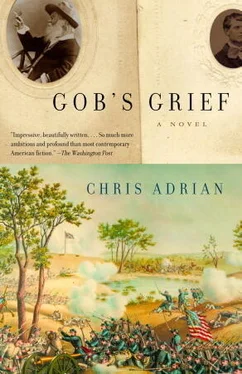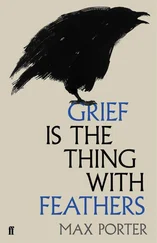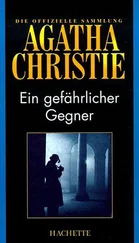“I like this place,” Walt said. He had gone to Mrs. Woodhull’s hoping to find Gob when there was no answer at the house on Fifth Avenue, but instead had found Dr. Woodhull. “The boys are still good,” he said, looking about him at the devastated men, some not so very much older than Gob, who leaned against each other and sang “Jeff Davis’s Dream.”
“War wraiths,” said Dr. Woodhull, and poured out his own story of ruin. He’d gone south after Armory Square was closed, and worked in a hospital in Charleston. Dr. Mary Walker went north to continue a career of professional female radicalism. Poor Canning Woodhull deteriorated without her, and without the war. “It made me something better than I am,” he confessed to Walt. “I used to dream of illness, and how it might be conquered. Ah, I talked with Aesclepius in my dreams, and he told me secrets. Now I cannot even talk to his dog, and I dream only of my own death. There I am in my coffin. Do you see me?”
“No,” said Walt. He tried to change the subject. “I am a good friend of your son. An exceptional young man. I think you must be very proud of him.”
“He hates me!” Woodhull moaned. “Oh, Gob hates me with good reason. I only came up here to die. I would have been content just to crawl under her bed and slowly expire, but she was kind to me. She feted me and made her friends my friends, and now I have caused her the most immense trouble.” It was May of 1871, convention time, and Mrs. Woodhull had charmed the National Woman Suffrage Association meeting in New York. But the very next day the papers had published an account of a lawsuit brought by her mother against Colonel Blood. The public eye looked closer at Mrs. Woodhull’s family and discovered that there were other Claflins besides her sister, and they were a grappling, squabbling bunch. The family disharmony was aired in court, and it became public knowledge that Victoria Woodhull had two husbands living in her house. “I am a bother to everyone I meet!” Dr. Woodhull said. Walt patted his hand.
“Not to me, sir,” he said.
“Oh Mr. Whitman,” Woodhull said dismissively. “You are everybody’s friend.”
* * *
There were other strange nights, besides the one at the Patent Office and Ford’s Theatre. Sometimes Gob would put on the hat, and Walt knew something curious would be presented to him as he walked with his friend in the city. They never had another session of naughty vandalism, but they wandered in naughty places, up Front Street and Water Street, where thugs stepped out of the river fog on cold evenings, only to be thrust aside by Gob’s strong arm. Once they leaned over the water and Gob shone a light on the river. Walt saw a baby, dead from a smashed head, floating a foot or two beneath the surface, one hand in its mouth and the other reaching towards him as if to tug at Walt’s fascinating beard. “The river is full of them,” Gob said softly. “Any day of the week you can come down and see them floating.” He took Walt farther up South Street, to a slip where a French steamer was docked, where they waited in the darkness, Walt asking repeatedly what they were waiting for, and Gob only saying, “Patience.” Suddenly, white light came blasting out of the sky, so bright Walt thought they must be in the midst of some impossibly silent explosion. But then there was noise, the spit and hum of an electric arc light burning high on the ship. “Isn’t it beautiful?” Gob asked him, luxuriating in the light as if it were warm sunshine. Walt held up his hand in front of his face, thinking it looked in that light like the hand of a corpse.
Another night they headed for Greenwood Cemetery in Brooklyn. Walt paused under the entrance, a massive sandstone edifice that looked like a little cathedral. Moonlit statues stared down at them while Gob picked the lock on the gates: a group representing the raising of the widow’s son, another representing Faith, Hope, Memory, and Love. “It should be your motto,” Walt said of the phrase carved into the stone above them. They passed inside, pausing, before they had walked very far, by the monuments of Charlotte Canda and De Witt Clinton. Little Pickie was with them on this graveyard outing. He leapfrogged over headstones, ran down into the empty moonshade beneath a willow. The three of them wandered over acres of cemetery, Gob offering comments every now and then: “There are one hundred and fifty thousand buried here,” or “Walt, we are gliding into eternity.”
Walt visited the grave of McDonald Clarke. “What a fellow!” he said to Gob. It made him glad, to think of the man, but Gob started to cry. “The heavens ought to open up!” he shouted. “They ought to weep!” Gob pounded his fist on the headstone, and the heavens did open up: a heavy summer rain began to fall, dark and thick and warm.
Each strange evening would end with a trip to Gob’s house, to the fifth floor. They’d walk into Gob’s room, passing by the stone circle (not even casting a glance at it), and pause before the iron door. Gob would throw it open, revealing his enormous workshop and his engine, a great nonsensical conglomeration of mechanical parts that sat under an enormous telescopic gaselier whose fittings were cast in the shape of birds that shot flame out of their beaks. Glass tubes and iron gears, steel ribs, yards and yards of twisting, wrist-thick bundles of copper wire, here and there a bone, after all, from the theater — it was bigger every time Walt saw it. It’s for you , Hank would say. You are a kosmos. Gob would say, “Won’t you help me, Walt? Won’t you help me win?” as he started a steam engine or activated a battery. “It’s not ready yet,” Gob would say, “but it will be, and then it will require your help to be complete. Will you give it to me, Walt?”
“Yes,” was always his answer. Walt would reach his hand out and touch a copper pipe, cold despite the June heat in the house. Pickie would dance around in a circle, saying, “Little brother!”
Sometimes they’d drink on these nights, but even when they didn’t, Walt would have a drunk feeling by this time. “You are the most important, Walt,” Gob would say to him as they lay in bed together. “There are others who will help me, but no one is as important as you are.” He’d sleep as dawn came, and wake with Gob’s head heavy as a chunk of wood on his shoulder. He’d look over and see the iron door, closed again and locked, and he’d have something in his belly, a question turned into a feeling — did it all happen? Every time Walt woke up he made a decision; he didn’t care to know the answer, he didn’t care about the answer. Gob was real, their beautiful, mountain-high, sea-deep affinity was real, squeezing him was real, his snort and his sleepy smile were real and natural and perfect.
Walt was invited to read a poem at the fortieth annual exhibition of the American Institute, a festival of industry. On September 7 he went with Gob, Tennie, and Miss Trufant to the Cooper Institute.
“I think you’ll be a most welcome change from Mr. Greeley,” Miss Trufant said to him before he mounted the dais to begin. It was usually Horace Greeley who gave the address every year. “He blathers.”
“Thank you, my dear,” Walt said.
The displays were still being assembled when Walt, dressed in a gray suit and white vest — gifts from Gob — climbed a stand to open the exhibition with his poem. On the fringes of the crowd, men in their shirtsleeves worked with hammers and saws and wrenches to put in order the displays of goods and machinery. They put down their tools as Walt read, so by the time he was half done the racket of assembly had quieted. He was thinking as he read of Gob, who stood holding Walt’s Panama hat at the foot of the stage. Tennie and Miss Trufant stood next to him. The iron door swung open in Walt’s mind, in the same way that the doors of Armory Square sometimes swung open to release memories of sickness and dying and death. The door opened and Walt saw gears and batteries, smelled acid and coal and fresh white steam. He heard Hank’s voice reading with him as he spoke: Earth’s modern wonder, history’s seven outstripping, high rising tier on tier with glass and iron facades.
Читать дальше












